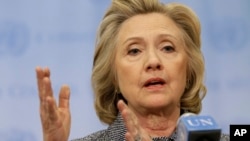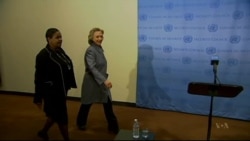Former U.S. Secretary of State Hillary Rodham Clinton addressed her use of a nongovernment email account while working at the State Department after speaking before a women's empowerment conference at United Nations headquarters on Tuesday.
"There are four things I want the public to know," she said. "First, when I got to work as secretary of state, I opted for convenience to use my personal email account, which was allowed by the State Department, because I thought it would be easier to carry just one device for my work and for my personal emails instead of two. Looking back, it would’ve been better if I’d simply used a second email account and carried a second phone, but at the time, this didn’t seem like an issue.
"Second, the vast majority of my work emails went to government employees at their government addresses, which meant they were captured and preserved immediately on the system at the State Department," she said, adding that, after leaving office, she provided copies of all work-related emails from personal accounts, totaling about 55,000 pages.
"Fourth, I took the unprecedented step of asking that the State Department make all my work-related emails public for everyone to see," she said. "I am very proud of the work that I and my colleagues and our public servants at the department did during my four years as secretary of state, and I look forward to people being able to see that for themselves."
Responding to questions from the scrum of reporters, Clinton said she deleted tens of thousands of other pages related to such private matters as plans for her daughter's wedding and funeral arrangements for her mother — mail she said was not worth keeping.
Clinton also said the personal email server based at her home in Chappaqua, New York, had originally been constructed for her husband, former President Bill Clinton, and that it was physically based on property guarded by the Secret Service.
She said the server has had no security breaches, and that she did not delete any work-related emails before handing them over to State Department officials.
Clinton delivered a statement at the beginning of a news conference in which she marked International Women's Day and criticized Republican legislators for sending Iranian leaders a letter regarding their nuclear weapons program.
Ongoing scrutiny
Her comments followed a week of intense scrutiny as she approaches a decision on whether to run for president. Clinton ignored the issue at a forum Monday while fellow Democrats urged her to speak out — and predicted she would — about her decision to conduct business while she was secretary of state in a private, nongovernment email account.
Republicans are ramping up their attention on the issue. Critics accuse her of trying to hide controversial communications, including those surrounding the deadly terrorist attack on the U.S. consulate in Benghazi, Libya.
Clinton's email practices have raised questions about whether she fully complied with federal laws requiring government officials to preserve written communications involving official business. Clinton said she complied with every rule that applied to her job.
Clinton was considering holding a news conference in New York within days to address the email controversy directly, according to a person familiar with her thinking. The person spoke on condition of anonymity and was not authorized to speak publicly.
'No Ceilings' project
Clinton spoke Monday at a carefully choreographed two-hour event involving her No Ceilings project at the Clinton Foundation, highlighting economic and educational opportunities for women and girls. She took no questions. When she sat down to lead more informal conversations with invited speakers, participants appeared to be reading from teleprompters.
The Republican National Committee used the vacuum to keep the pressure on Clinton, noting a State Department policy requiring all outgoing employees to declare that they had turned over all unclassified job-related documents to responsible officials before leaving.
RNC Chairman Reince Priebus said in a statement the "fact that Hillary Clinton did not abide by the same rules her State Department employees had to comply with is just the latest example of how the Clintons think the rules don't apply to them."
White House reaction
At the White House, spokesman Josh Earnest said President Barack Obama indeed knew she was using a nongovernment account during her tenure. Obama had indicated earlier that he only learned of that from recent news reports.
Earnest said the president actually learned from those news reports of Clinton's privately run email server, but was familiar with her private account earlier because the two had exchanged emails when she was in office. Obama did not know at the time that she was using private email exclusively, Earnest said.
Clinton left the State Department in early 2013. It was not immediately clear if Clinton signed the required separation statement declaring that she had turned over all job-related material, but State Department spokeswoman Jen Psaki said the secretary of state is supposed to follow such department policies. A Clinton spokesman did not immediately comment.
Urged for explanation
Democrats have defended Clinton, but several senators from the party called on her to offer an explanation.
"She should come forward and explain the situation," Sen. Dick Durbin, the No. 2 Senate Democrat, said Tuesday on MSNBC. "I think it's only fair to say to Hillary Clinton: Tell us your side of the story. ... What did you put on this personal email?"
Last week, Clinton said in a Twitter message that she wanted her emails released by the State Department as soon as possible, but did not address why she did not put them out herself immediately. Clinton's spokesmen and the State Department have said she never received or transmitted classified information on her private email account, in which case there would be no concerns that disclosure of her messages could compromise national security.
The State Department is reviewing the 55,000 pages of emails that she has turned over, a process expected to take several months. Republicans in Congress have said they plan to review her email practices.
Survey results
Meanwhile, a new Pew Research survey shows few Democrats care about the email controversy and that fewer than half of Republican voters are closely following the story.
Polls taken before the email issue show Clinton far out in front of other possible Democratic candidates for the White House in several states. The polls say she would beat several likely Republican candidates by a landslide in the general election.
Analysts say it is too early to know whether the former secretary of state will be politically damaged by the email controversy if she decides to run for president.
Larry Sabato, head of the Center for Politics at the University of Virginia, said that Hillary and Bill Clinton have been in the public eye for so long that people already have solid opinions about them, and that this issue is unlikely to affect those views, even if Hillary runs for president.
“If you read the daily press. you think that everything matters," he said. "And the truth is that in elections, as in life, hardly anything matters. Most of these things are long forgotten by the time the voting takes place, which after all is nearly two years away.”
Watch video report from VOA's Zlatica Hoke:
VOA's Margaret Besheer contributed to this report from the United Nations. Some information for this report came from AP and Reuters.







